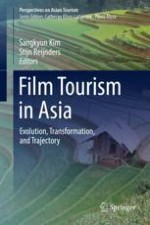2018 | OriginalPaper | Buchkapitel
12. Power of Dramas: A Comparison of Voluntourism Between Chinese and American Film Tourists
verfasst von : Jun Shao, Ulrike Gretzel
Erschienen in: Film Tourism in Asia
Verlag: Springer Singapore
Aktivieren Sie unsere intelligente Suche, um passende Fachinhalte oder Patente zu finden.
Wählen Sie Textabschnitte aus um mit Künstlicher Intelligenz passenden Patente zu finden. powered by
Markieren Sie Textabschnitte, um KI-gestützt weitere passende Inhalte zu finden. powered by
